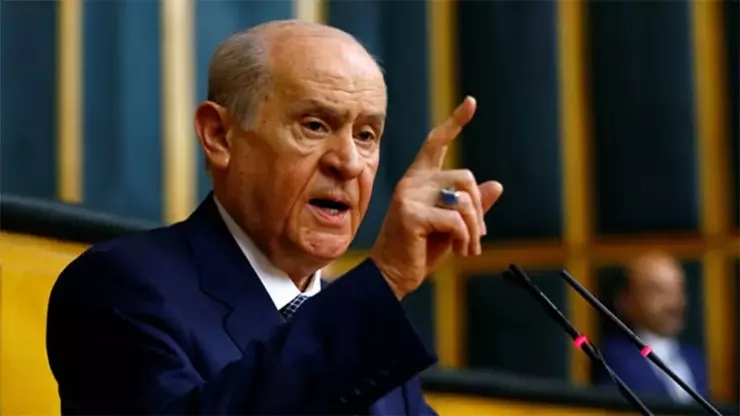Onur Alp Yılmaz wrote: A guide to understanding the MHP

Estimated reading time: 9 minutes
In the early 2000s, the AK Party was bringing one after another of the minefields of Turkish politics onto the political table: the Kurdish issue, Cyprus, Armenian allegations, EU reforms…
With this strategy, the AK Party aimed, on the one hand, to legitimize its rule in the international arena, and, on the other hand, to expand its political sphere by breaking the established alliances by overcoming the state's "red lines" within the country.
More clearly, the AK Party's main aim here was to dismantle the alliance that had removed its predecessor, the Erbakan movement, from power in just one year.
The main components of this alliance were the Turkish Armed Forces, TÜSİAD, the media, and other political parties, including the MHP, which was competing to garner legitimacy from the created emergency.
For this to happen, the AK Party needed to normalize Türkiye's extraordinary agendas.
As a matter of fact, the international environment was extremely suitable for this.
In the post-September 11, 2001 period, the US was building a new Middle East strategy centered on the concept of “moderate Islam.”
Türkiye's status as a "model country" in this strategy, with its Muslim and democratic identity, opened up a space for the AK Party to strengthen its foreign legitimacy.
Again, during the same period, the EU was preparing for a wave of expansion that would include Eastern Europe.
The “candidacy process” that began for Türkiye with the 1999 Helsinki Summit provided a legitimising framework for the AK Party’s pressure for reform and groundbreaking moves.
The AK Party used "EU membership" both as a tool of pressure in civil-military relations and as a tool to restore confidence in the capital class.
The MHP, on the other hand, tended to interpret this opening up space not as democratization, but as a breach in the survival of the state.
As we moved towards the mid-2000s, the EU framework, the Annan Plan in Cyprus, the AK Party's efforts to establish a dialogue with Armenia against the rise of Armenian genocide allegations on the global agenda, and its approach that transcended the dominant paradigm on the Kurdish issue and Cyprus, all came together on a single axis in the MHP's mental map: "Submissionism."
This was the framework that accompanied every step taken during this period.
Erdoğan’s famous 2005 Diyarbakır speech was read as “legitimizing separatism,” and Bahçeli accused Erdoğan of aligning himself with the PKK and EU’s theses.
The EU process was interpreted as “a project to weaken Türkiye through ethnic-cultural rights.”
In Cyprus, the defense of Denktaş became the litmus test of national stance.
The MHP had virtually become the “anti” of everything the AK Party stood for.
This was a period of opposition with the "bazaar is against everything" style.
The most naked form of this security-based reading in political practice was seen in Bahçeli’s “letter to 313 generals”: a reflex that once again calls upon the established order to take control of civilian politics…
As the presidential election approaches, the MHP claimed that the AK Party was aiming to “take over the state.”
This was also the framework of the indirect message given to secular voters.
So much so that, during this period when Gül’s candidacy was not yet on the agenda and discussions about Erdoğan’s candidacy were ongoing, Bahçeli even said that if the MHP entered the Turkish Grand National Assembly, they would remove Erdoğan from the presidential seat by a parliamentary decision.
The rhetoric has hardened, so much so that the concept of "non-national power" has become the axis of the MHP's discourse.
A speech made by Bahçeli at his party's regional consultation meeting in 2007 is a very good example of the attitude I am talking about:
“The “active foreign policy” of surrender,
"Victory and progress" of unprincipledness,
Giving away is “marketing the country”,
“Co-chairmanship” of global subcontracting,
The “dialogue” of submission,
“Transformation and change” of collaboration,
Diplomatic blackmail is called “negotiation”,
In this dark period when the anti-national mindset is defined as “strategic vision”… The Prime Minister is leaving aside the problems that concern our country and working for an alliance of civilizations as the Greater Middle East Project co-chair.”
But of course, this harshness was not merely ideological.
The possibility of a shift in the balance of power within the bureaucracy was also a threat to the networks the MHP had woven over the years.
It should not be forgotten that during these years, the AK Party was trying to liquidate the existing bureaucracy, in which the MHP was also extremely powerful, by vertically organizing the Fethullahists, who had been horizontally organized until then, within the bureaucracy.
In other words, underlying the MHP's extremely violent stance was the concern that the existing established order, which was strong in the field of bureaucracy, would be replaced by a new one.
However, the government had largely carried out this purge, at least in the upper echelons.
The coalition stalemate that followed June 7, 2015, the resumption of conflicts, and the reclaiming of the majority on November 1 with the rhetoric of “stability” perpetuated the logic of emergency rule.
During this period, the government began to fill the bureaucratic space vacated by the Gülenists with nationalist-security elements, and halted the MHP congress with a decision of the civil court of first instance, offering Bahçeli the basis for a new alliance.
This was a platform that overcame the political deadlock of both Bahçeli and Erdoğan at the same time.
For Erdoğan, his presidential bid collapsed with the June 7 elections, and the AK Party lost single-party power for the first time.
In such an environment, the AK Party needed a “meta-narrative” to maintain its power without having to form a coalition, that is, without granting legitimacy to the opposition.
The discourse of “the survival of the state” ensured this.
This discourse enabled Erdoğan to both overcome the deadlock in civilian politics and legitimise the emergency rule.
For Bahçeli, the risk of losing his power within the party (Akşener team) was eliminated, and the blessings of power could be distributed to the party base, which was disturbed by the MHP's rejection of the blessings of power after June 7, under Erdoğan's administration.
With the July 15 coup attempt that took place at this very moment, Bahçeli was able to create a moral legitimacy for his collaboration with the government to protect his position with his " survival" rhetoric.
But there would undoubtedly be a reward for this.
This meant that Bahçeli himself paved the way for the transition to the presidential system, which he had previously strongly opposed.
As a result, the crisis that emerged with the July 15 coup attempt quickly turned into regime engineering, and Turkey quickly transitioned to a presidential system based on an antagonism that institutionalized the “national” and “non-national” distinction.
In short, in the aftermath of June 7th, the MHP transformed the “state survival”-oriented opposition discourse it had used for years against the AK Party into a power practice against the opposition, this time alongside the AK Party government.
The consent given to the narrowing of civilian space in the name of “the survival of the state” was now the basis of legitimacy for the People’s Alliance and the presidential system.
In other words, Bahçeli reiterated his criticism of Erdoğan, “you are pushing the state’s red lines,” which he had directed at him since the mid-2000s, this time alongside Erdoğan against the opposition in the post-2016 period.
After 2023, the picture changed.
This time, the government has become the actor trying to shake the balance it has established, while Bahçeli has become the actor trying to preserve that balance.
To overcome the domestic economic pressure and international isolation, Erdoğan attempted to reconnect with the West, establish a balance with Gulf capital, and align with Western theses and pursuits in foreign policy.
However, this move loosens the security equation constructed after 2016; it threatens the “continuity of the state of emergency” that forms the basis of the MHP’s existence.
Because Erdoğan's search for a new balance centered on the US and the Gulf has the potential to erode the MHP's influence both in the state and in politics.
That's why Bahçeli has a strong intuition for his party: If Erdoğan can perpetuate his stability with external support, he will no longer need either social support or security partners.
This means that Bahçeli's harsh words about the US, Cyprus, or Palestine today are not ideological, but strategic.
In other words, Bahçeli reminds Erdoğan of the possibility of provoking social sensitivities through these areas and says the following:
“If this regime loses its security balance, surrenders to the West and tends towards a dynasty, the legitimacy behind it will collapse.”
In other words, Bahçeli's main goal is to make the security-centered "balance regime" between 2016 and 2023 permanent.
Ultimately, this balance is both the bureaucratic and political insurance of the MHP.
Therefore, the aggressive rhetoric Bahçeli is displaying today should be read not as ideological but as a defense of the status quo.
For example, Bahçeli's claim that there is a parallel structure within the state - which our opposition technicians immediately jumped on and affirmed by saying "he is criticizing a sect" - is not independent of this.
As a matter of fact, we all know that the process in which Fethullahists are replaced by other sects within the state, and in which every institution is virtually identified with a sect, is not new.
The reason for Bahçeli's discomfort here is this: The government, which filled the space vacated by the Gülenists in 2016 with MHP cadres, is now trying to open this space to the West and organic Westernists after 2023.
The government's recent search for rapprochement with many actors, especially Babacan, should not be evaluated independently of this.
Or Bahçeli's TRÇ statement...
The most critical pillar of the “Eurasianist-securityist balance” after 2016 was Russia; harsh statements like the Turkish-Russian Outburst serve as a warning against Erdoğan’s pursuit of renormalization with NATO and the EU: “You are upsetting the balance.”
In other words, Bahçeli is not taking an ideological position against the West, but rather one to protect the balance regime.
Again, Bahçeli's Cyprus move... It is not independent of the US's quest to turn Israel into an energy hub for the Caspian, Middle East and Eastern Mediterranean, and more importantly, the possibility that the government will align with the US's theses and, in return, generate income to finance its regime, thus eliminating the MHP from the system.
Therefore, instead of hoping for democracy from Bahçeli, we need to see this naked Machiavellianism in his statements, which sees power as an end, not a means.
The reason for Bahçeli's complaint is clear: the fear of losing his power and influence within the state.
Medyascope





